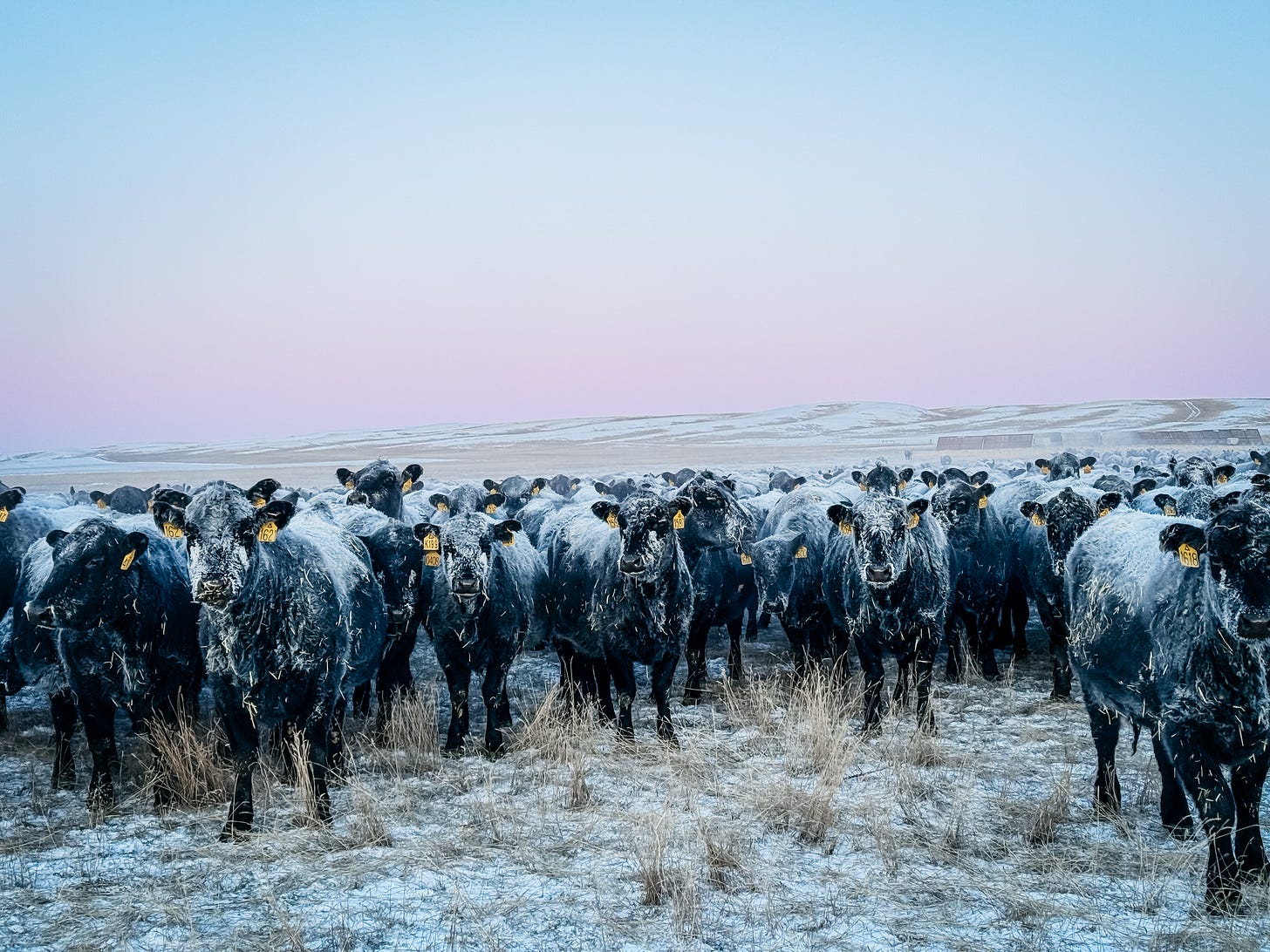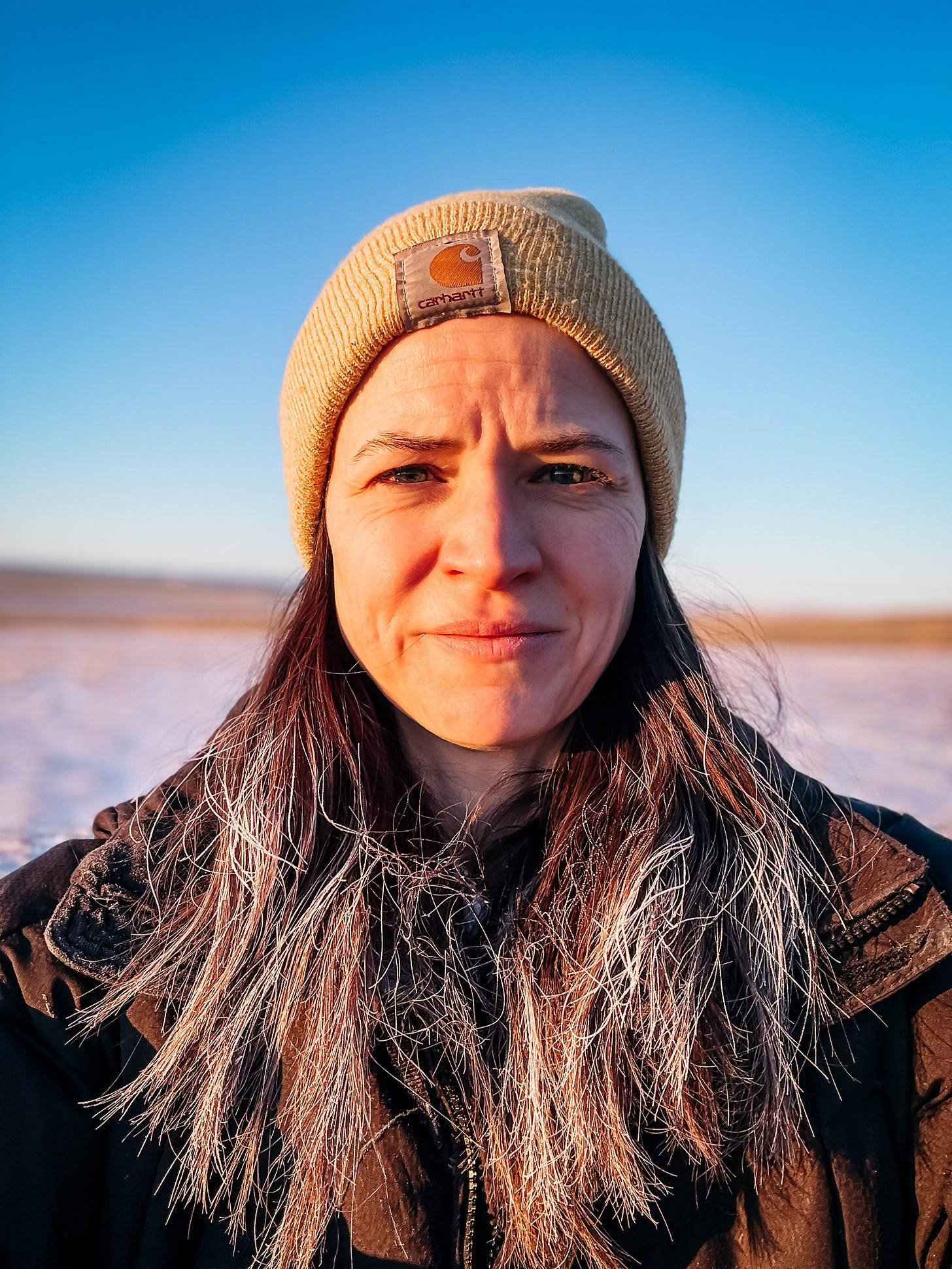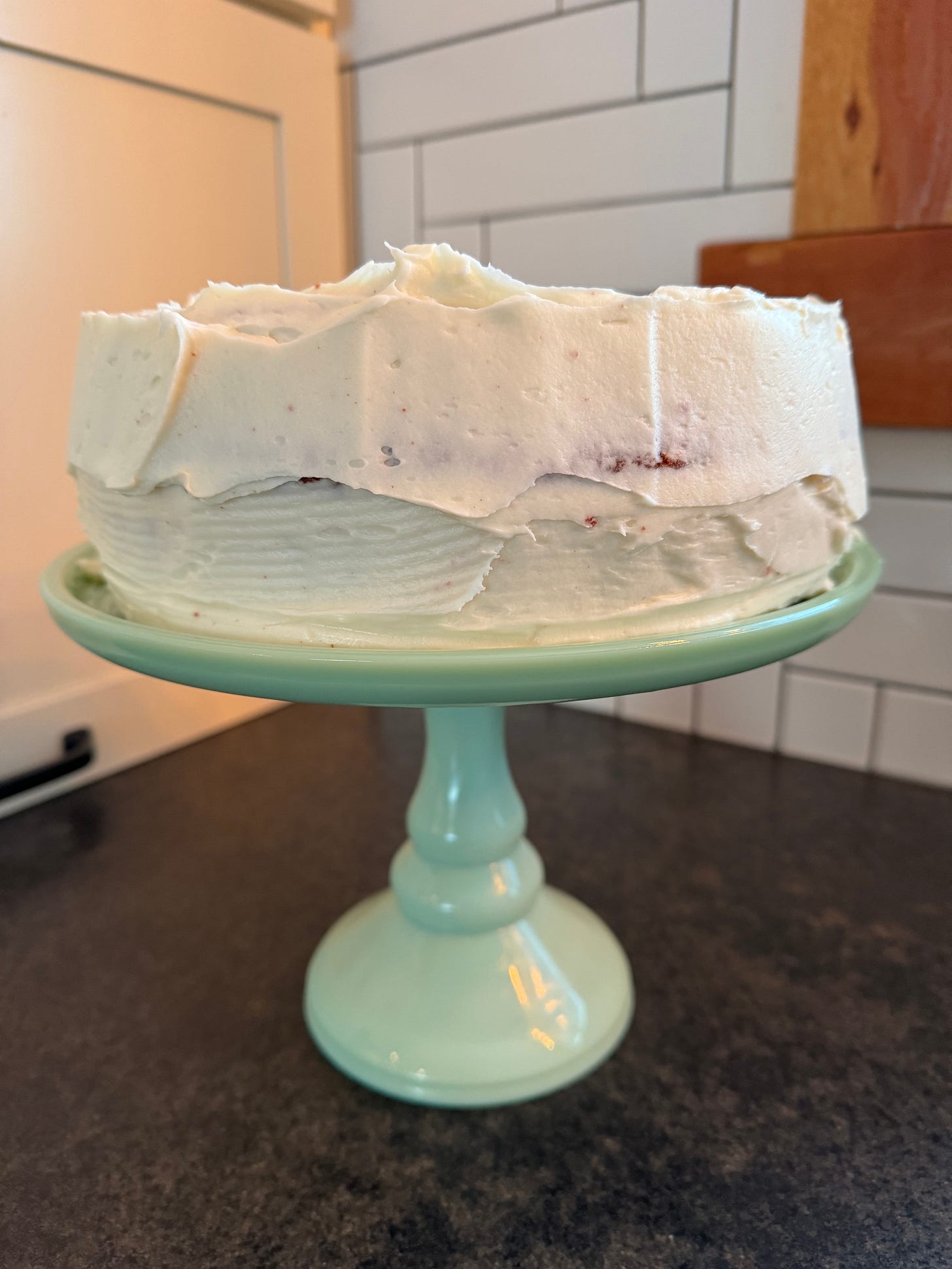Eleven years ago, I rarely paid attention to the weather. I would have agreed that talking about the weather was boring, pointless, even. If it was sunny out, I put on sandals and shorts. If it was raining, I dressed accordingly. I didn’t bother paying attention to the next day’s forecast because why worry about tomorrow? The weather didn’t really affect me. Or my livelihood.
Today, I still don’t pay attention to the weather forecast. But that’s only because my farmer pays enough attention for both of us. Two weeks ago, Rich told me that the temps would plummet to well below zero; some nights, it would drop to -35° and -40°F. I thought of the cows behind our house, wondering if they would calve in the next few days.
“Will we need to check the cows at night?” I asked. I knew it was early, that calving shouldn’t start for at least a week—when the crew would watch the cows 24/7, the calves protected by the warm barn. But I also knew that some calves come early, and a calf wouldn’t survive those temps like their mothers can.
“Yeah, we’ll have to go out and check every few hours,” he said.
The first two nights, we checked, taking turns throughout the night, and with relief, the sun came up each morning with no calves on the ground.
On Saturday night, the temperature forecast was the lowest. I rolled over in bed, wondering how much time I had before my alarm went off. My alarm was set for midnight—and I knew it had to be getting close. I picked up my phone and noticed my alarm was going off, but the ringer was silent. It’d been years since I’d slept with my phone in the bedroom, and clearly, I didn’t remember how to set the alarm. I sighed, thinking of the bitter cold temperature outside, and a sense of dread settled in.
Rich stirred in bed beside me, then groggily asked, “Did you just get back?”
“No, I’m about to go,” I paused. “But I’m nervous.” The night before, I went out by myself and found no calves or cows calving. But that night, I felt anxious.
“Do you want me to go with?” he asked.
I felt guilty for a second, forcing him out of bed again. And I thought of leaving the kids but knew we wouldn’t be gone long and that our house would never be out of sight.
“Yes,” I answered.
We stepped out of the bedroom, into the quiet house. The kids asleep for hours. I silently put on my outdoor clothes, pulling on my Carhartt overalls, sliding my feet into my insulated boots, and then pulling my stocking hat onto my head.
I quietly closed the door behind me; then, we crunched through the snow and into the pickup. The engine was slow to start, and it sounded like it was taking everything it had to run. The thermometer on the dash read -35°. We slowly made our way to the pasture behind our house, the cows' eyes glowing in the pickup’s headlights.
We drove around, using a spotlight on the cows, the pickup tires crunching and bouncing over the frozen mounds of manure. We stopped by the cows in front of the windbreaks—most of the cows were sheltered there—their backs covered in snow and ice.
Rich parked and stepped out of the driver’s seat, and I followed him out of the passenger door. We climbed into the pickup bed, using height to get above the cows—to make sure we weren’t missing anything. The air felt like needles on my face.
Rich shined the light over the cows, carefully passing over each one—a challenge with hundreds of them. We stood silently, listening. We heard the occasional crunch of hooves on the snow and the cow’s bellies gurgling—but the air was still. Everything felt calm despite the brutal temperature. The black sky hovered above us, stars shining bright. As we were about to climb back into the pickup cab, we heard a calf bawling in the pasture.
“Did you hear that?” I asked.
“Yes, let’s go,” he said. We both jumped out of the pickup bed and hopped inside.
My stomach churned, my motherly instincts kicked into gear, thinking of the bitter temperatures on a wet calf and the two coyotes we saw running through the pasture minutes earlier.
We drove toward the sound of the calf and spotted it on the ground, with three cows standing guard. Rich threw the pickup into park and jumped out, and I followed behind.
“Grab the blanket,” he called.
I opened the back door and pulled out the old blue U-Haul blanket I washed the day before in hopes we wouldn’t need it.
I threw the blanket on top of the calf, and Rich picked the calf up, placing him in the backseat of the pickup. Rich took note of the heifer’s ear tag—the afterbirth hanging out, telling us who the mother was—so we could reunite the right mother with the calf in the morning.
Once inside the pickup, I cranked up the heater (this story has vibes of having Nora in the pickup—this same pickup. And yes, at some point, Rich did mention having more amniotic fluid in his pickup). I turned to the backseat and began rubbing the calf’s back and nose, talking to him. He continued to bawl as we drove toward our heated shop.
“That bawling saved your life,” Rich said, his hands on the steering wheel.
Rich carried the calf into the shop, placing him on the floor beside a combine under the heater.
“Should we feed him?” I asked, knowing how babies—human and bovine—come out hungry and looking for milk. I knew it would be hours before there was enough light to find his mom in the herd and reunite them.
“Yeah, we’ll need to go to the barn. Let’s let the calf warm up, and then we’ll go,” he said.
I stroked the calf’s ears, “We’ll be back,” I whispered.
We drove to the still quiet house. I lay on the couch, closing my eyes, stretching my toes and calves, warming up in front of the wood stove.
Thirty minutes later, we dressed again and drove to the barn. We made a bottle of milk replacer and grabbed the tubing kit in case the calf was unable to suck on his own.
Once back at the shop, Rich tried to get the calf to suck the bottle, but he wouldn’t. Wanting to get nutrients into his belly, he poured the milk into the tubing kit. Rich placed the tube down the calf’s throat and let the warm milk slowly slide into the calf’s belly.
Eventually, we returned to the pasture, checking the cows again before heading to bed. But all was quiet. After a couple of hours of sleep, just before daylight, Rich went back to the shop and found the calf exploring, up on his own four feet. Later that morning, we sorted his mother off from the herd, loading her into a horse trailer and taking her to the barn. The two reunited, the calf learned to nurse on his own.1
I kept thinking how close we were to losing the calf. If we had gone to the pasture an hour later, it likely would have been too late. Or if we had gone out to check an hour earlier, we would have been too early. I said a prayer of thanks that the timing worked out.
The following night, we alternated shifts, but no cows calved. And none of them calved during the day, either. The next night, I found a calf when I was out alone, and I woke Rich up to help me get it to the barn. The following afternoon, we moved all the cows to the ranch yard, where they are now watched day and night—each calving cow brought into the barn. My night calving over until next year.2
The weather still isn’t my favorite topic, but I do have a greater appreciation for it. There are many times the weather frustrates me—rain often dictates our schedule. Before marrying a farmer, I never knew that knots would form in my stomach, seeing another day without rain. On the other hand, there’s nothing like the weight lifting from my body when the sky opens up, rain pouring over our crops.
Knowing the forecast doesn’t change the weather. We can’t make it rain when the soil is desperately dry. We can’t stop the bitter temps from coming. Knowing the forecast allows us to prepare the best we can—taking care of our animals and crops despite the elements.
During calving, we have a big lunch together—family and employees—gathering around my mother-in-law’s kitchen table, taking a break from the barn. This red velvet cake has nothing to do with calving, except that my sister-in-law’s birthday falls during calving season. She usually spends her birthday in the barn and on horseback.
I hadn’t made a red velvet cake in years, although it used to be one of my favorites. I pulled out Ree’s first cookbook (I have them all, and this one is probably my favorite) and made her two-layer red velvet cake.3 I was hesitant to try it because layer cakes are challenging (for me, anyway).
The cake turned out about like I expected. They came out of the pans easily, which was a pleasant surprise. But then, when I went to frost them, I ended up with some crumbs in the frosting, and I didn’t get it as smooth as I wanted. But I think the pretty cake stand made up for it.
The calf is doing well today! We don’t name our cows or calves, but the kids and I gave this one the nickname “Lucky.”
Every cattle operation is different, but when we are “full-on” calving (like we are now), someone doesn’t go out and periodically check—like Rich and I did. We have two people who work the “night shift” and are up all night with the cows, not just checking them every few hours. That only works for us in the early stages of calving, before the action really starts.
I couldn’t find this recipe online. You’ll have to get it from the cookbook! 😉 I did find Ree’s recipe for a red velvet sheet cake. The cake recipe looks the same, but the frosting is completely different. Let me know if you try it!







I was on the edge of my seat the whole time I was reading this! I can't even imagine this being a regular occurrence. So relieved that Lucky made himself known.
Last winter - I believe it was the night before Christmas Eve, 2022 - we had some crazy cold temperatures (similar to yours, -35ish with windchill), and I woke my 25-year-old son in the middle of the night to help me go check on the chickens. We bundled up and ran out in the pitch-black yard to peek through the coop door....and there they all were, sound asleep just like always. It didn't occur to me at the time that I had no actual plan for what to do if they were in distress, nor would I even be able to tell if they were in distress...they could just as easily have been frozen to death as asleep, and I wouldn't know until the next day. Somehow the "checking" made me feel better, like I'd done something - even though I'd done nothing! I was able to get back to sleep after that, though.
One of our roosters had frostbite on his comb after that, but none of the rest of them were worse for wear. Crazy the kind of weather conditions they can withstand.
I just loved this story so much, Stacy!! And the pictures as always <3